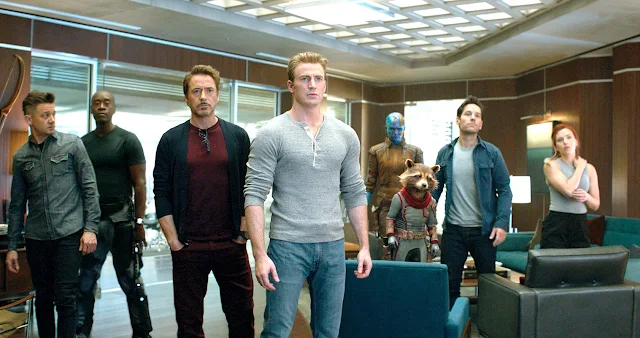Avengers: Endgame (Anthony Russo, Joe Russo, 2019)
Cast: Robert Downey Jr., Chris Evans, Mark Ruffalo, Chris Hemsworth, Scarlett Johansson, Jeremy Renner, Don Cheadle, Paul Rudd, Karen Gillan, Josh Brolin. Screenplay: Christopher Markus, Stephen McFeely. Cinematography: Trent Opaloch. Production design: Charles Wood. Film editing: Jeffrey Ford, Matthew Schmidt. Music: Alan Silvestri.
Back in September, I had this to say about Aquaman (James Wan, 2018):
"I sometimes feel with the comic-book-sourced superhero movie that we have moved not just into a separate genre but into an entirely separate medium: a fusion of video games, technology, and neo-mythology that's something other than traditional cinematic storytelling."A few weeks later, Martin Scorsese said much the same thing:
“I don’t see them. I tried, you know? But that’s not cinema,” Scorsese told Empire magazine. “Honestly, the closest I can think of them, as well made as they are, with actors doing the best they can under the circumstances, is theme parks. It isn’t the cinema of human beings trying to convey emotional, psychological experiences to another human being.”
I bring this up not to express some sort of solidarity with Scorsese, or to try to boast that I said it first, especially since Scorsese's remarks have been bouncing around the internet ever after. It should be pretty apparent from the films that I write about in this blog that my interests are centered largely in "the cinema of human beings," in Scorsese's phrase. But I think, too, that there's a place for movies like the ones Scorsese seems to be excluding from the canon of cinema. And I bring this up because last night I was faced with a choice: I could watch Scorsese's The Irishman on Netflix, or Avengers: Endgame on Disney+, to which a family member subscribes and had given me her password.
I chose Avengers: Endgame because I was tired and full of Thanksgiving dinner, and I wanted to give Scorsese's movie my full attention. I also knew that there would be no surprises in the movie I chose to watch instead: There would be familiar characters, some jokes, some emotional moments, and lots and lots of action. I would not have to think, to puzzle out motives, to try to place the film in the canon of its auteur.
And I was happy with my choice. I was entertained by actors doing fine work in their métier, with bright and colorful action, with a few sci-fi conundrums about time travel. I enjoyed seeing characters from other Marvel movies come together in new combinations. I was pleased with the richness of the casting -- dazzled, in short, by so many handsome stars. I turned off the movie relaxed and satisfied.
Will I think about Avengers: Endgame and want to see it again? Probably not. Certainly not in the way I will think about and perhaps rewatch Carlos Reygadas's Japón, Hirokazu Koreeda's The Third Murder, Julián Hernández's Raging Sun, Raging Sky, or even Otto Preminger's The Man With the Golden Arm, to name some of the works from the "cinema of human beings" I've seen and written about recently. But that doesn't mean that blockbuster movies, the ones that cost and make millions of dollars and are seen by millions of people around the world, are unworthy of my attention. It's just that they serve a different need, they speak to a different part of the soul.

